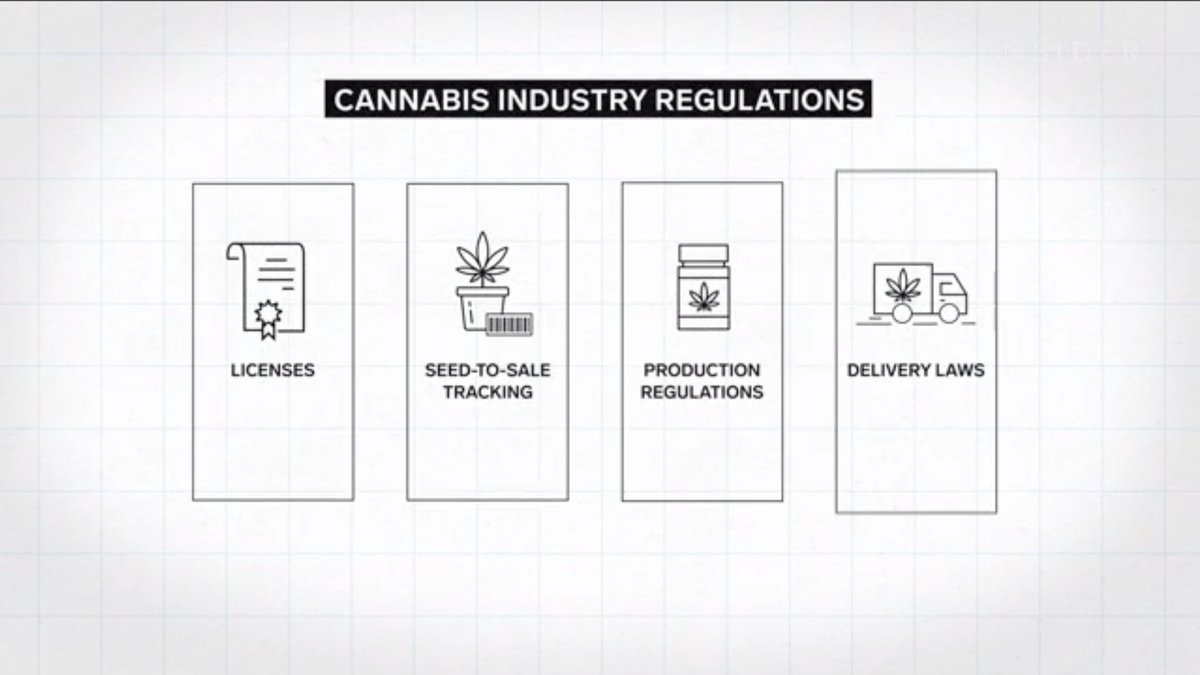We visited three marijuana companies across the US to see why cannabis industry regulations are so tough to follow and how they're keeping entire communities out of the growing industry.
Since marijuana is still illegal on the federal level, every state has free rein on how to regulate it. Some states may require you to have $250,000 cash on hand, which begins to immediately lock out whole communities from starting marijuana companies. businessinsider.com/marijuana-lega… 

Will and Adriana wanted to start a farm in California. But there, a license to grow can cost almost $80,000, with an $8,000 application fee. That's a lot more than a liquor license in California, which can cost just over $15,000 max.
They decided to put down roots in Oregon. There, a license and application fee costs between $4,000 and $10,000. In both states, aspiring cannabis entrepreneurs also have to sign a lease on a property before they can apply for a license. They had to wait two years for a license.
They applied for a grant through NuLeaf, a nonprofit that helps fund Black- and brown-owned cannabis companies, and were awarded $10,000 to start Magic Hour Cannabis.
But the expensive regulations don't just stop at the license. In Oregon, the government requires farms to have seed-to-sale tracking, which is a process for the state to understand the flow of cannabis into the illicit market. The state tracks plants using tags with barcodes.
There’s a whole other set of regulations for turning marijuana into edibles. In each new state it enters, @WanaBrands — a top THC gummy maker in the US — has to follow different manufacturing and packaging laws.
Adrian Wayman started @GreenBox_pdx, a delivery and subscription service in Portland. It wasn’t without a fight. He started lobbying for delivery-only retailers and has built a business around the delivery model, but he has to follow strict regulations for delivering marijuana.
All of these unavoidable regulations make starting a weed business really expensive. @Forbes reported startup costs could be as high as $1 million for a dispensary and raising that kind of capital can be hard.
Since marijuana is a federally illegal substance, the businesses can’t apply for a small-business loan or use credit cards, so the businesses mostly have to function using cash. This makes having access to capital necessary.
businessinsider.com/cannabis-banki…
businessinsider.com/cannabis-banki…
Only 2% of cannabis entrepreneurs are Black. Yet, Black Americans were most affected by marijuana's illegal status in the past.
businessinsider.com/cannabis-indus…
businessinsider.com/cannabis-indus…
According to the @ACLU, Black people are four times as likely than whites to get arrested for cannabis use, despite using at similar rates across age groups. Those in favor of federal legalization believe it could close the capital gap and ease regulations. 

Follow @BusinessInsider for everything you need to know on the cannabis beat. businessinsider.com/us-cannabis-ma…
• • •
Missing some Tweet in this thread? You can try to
force a refresh








